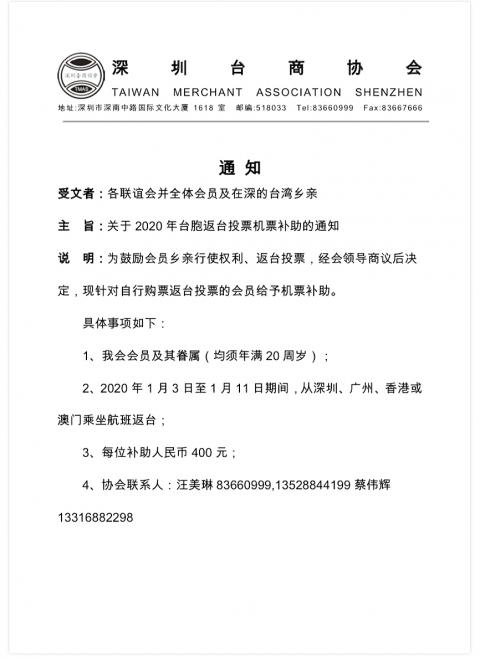Chinese authorities have been meeting with Taiwanese businesspeople in China and mobilizing them to return home to vote in Jan. 11’s elections, a source said on Saturday.
The Taiwan Merchant Association Shenzen on Thursday last week issued a memo saying that, following discussions with “authorities,” it would help its members and their family pay for return flights to Taiwan, the source said, adding that all family members eligible to vote would receive 400 yuan (US$57.18).
A larger subsidy of 600 yuan would be provided to those taking a specific flight in the early hours of Jan. 10, they said.

Photo courtesy of a reader
The association confirmed the subsidies over the telephone.
To be eligible the association member or members of their family would need to depart from Shenzhen, Guangzhou, Hong Kong or Macau on a direct flight to Taiwan, the association said.
The association has been providing flight subsidies for years, and it has long been understood that Chinese authorities influence Taiwan’s elections through such associations, Taiwan Democracy Watch chairman Sung Cheng-en (宋承恩) said on Saturday.
Members of China’s Taiwan Affairs Office (TAO) often attend meetings hosted by these associations prior to elections, the Mainland Affairs Council (MAC) said.
Judicial authorities would need to determine whether there were any legal implications regarding these meetings and subsidies, the council said.
The addition of cross-strait flights for the elections would need approval from Chinese aviation authorities, with the TAO acting as an intermediary, it said.
In the past few years, the TAO had been instrumental in encouraging Chinese travel agencies to provide Taiwanese businesspeople with discounted tickets, which caused alarm over the office’s influence over the elections, the source said.
The China-based Association of Taiwan Investment Enterprises on the Mainland in September requested discounted flights, and Chinese airlines responded immediately, the source said.
At the time, Shenzhen Airlines suggested that return flights be priced at a 50 percent discount of 1,500 yuan for Taiwanese businesspeople flying home for the elections, the source said.
Those returning twice — once to vote and once again for the Lunar New Year holiday — could purchase two return tickets through the airline for a total of 3,000 yuan, provided they would be in Taiwan on election day, the source said.
Judicial authorities would thoroughly investigate suspected vote-buying of any form, the council said.
Airlines and travel agencies should avoid providing discounts or benefits that could be seen as aiming to influence the outcome of the elections, it said.

Taiwan is to have nine extended holidays next year, led by a nine-day Lunar New Year break, the Cabinet announced yesterday. The nine-day Lunar New Year holiday next year matches the length of this year’s holiday, which featured six extended holidays. The increase in extended holidays is due to the Act on the Implementation of Commemorative and Festival Holidays (紀念日及節日實施條例), which was passed early last month with support from the opposition Chinese Nationalist Party (KMT) and Taiwan People’s Party. Under the new act, the day before Lunar New Year’s Eve is also a national holiday, and Labor Day would no longer be limited

Taiwan is to extend its visa-waiver program for Philippine passport holders for another year, starting on Aug. 1, Minister of Foreign Affairs Lin Chia-lung (林佳龍) said on Friday. Lin made the announcement during a reception in Taipei marking the 127th anniversary of Philippine independence and the 50th anniversary of the establishment of the Manila Economic and Cultural Office (MECO) in Taiwan, the Ministry of Foreign Affairs said. The decision reflected Taiwan’s commitment to deepening exchanges with the Philippines, the statement cited Lin as saying, adding that it was a key partner under the New Southbound Policy launched in 2016. Lin also expressed hope

Costa Rica sent a group of intelligence officials to Taiwan for a short-term training program, the first time the Central American country has done so since the countries ended official diplomatic relations in 2007, a Costa Rican media outlet reported last week. Five officials from the Costa Rican Directorate of Intelligence and Security last month spent 23 days in Taipei undergoing a series of training sessions focused on national security, La Nacion reported on Friday, quoting unnamed sources. The Costa Rican government has not confirmed the report. The Chinese embassy in Costa Rica protested the news, saying in a statement issued the same

Temperatures in New Taipei City’s Sindian District (新店) climbed past 37°C yesterday, as the Central Weather Administration (CWA) issued heat alerts for 16 municipalities, warning the public of intense heat expected across Taiwan. The hottest location in Taiwan was in Sindian, where the mercury reached 37.5°C at about 2pm, according to CWA data. Taipei’s Shilin District (士林) recorded a temperature of 37.4°C at noon, Taitung County’s Jinfeng Township (金峰) at 12:50 pm logged a temperature of 37.4°C and Miaoli County’s Toufen Township (頭份) reached 36.7°C at 11:40am, the CWA said. The weather agency yesterday issued a yellow level information notice for Taipei, New